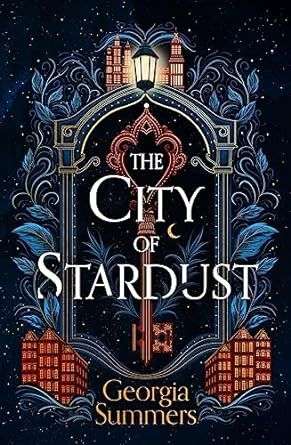We’ve implemented some new protocols around sending us messages via this website. Please email website “at” britishfantasysociety “dot” org for any issues.

For all things fantasy, horror, and speculative fiction
-
Announcement:

The City of Stardust
THE CITY OF STARDUST by Georgia Summers.
Hodderscape. h/b. £16.99.
Reviewed by Elloise Hopkins.

It is not often that there is a knock at the door, and Ambrose Everly cannot believe who it is. His brother, Gabriel, home for the first time in two years. There are mixed feelings, for it was Ambrose who stayed home to raise his niece, Violet after her mother left. It was Ambrose who gave up his degree and his future so that Gabriel could live his. Marianne’s decision to leave had changed all of their lives… and she had never returned.
Now twelve, having been kept secret all her life, Violet is a secret no longer. A visit from a strange woman and her assistant puts an end to Violet’s closeted life. If Marianne is not found within ten years, Violet will be taken instead to fulfil a debt made by her ancestor. A debt she did not know about until now. A curse lies upon the Everly family, and it carries a debt that cannot be written off.
From that moment, time continues turning. Violet enters the world. Gets a job. Turns 15. Wonders if perhaps she will go out into the world on an adventure like her mother did. Turns 17. Then 21. She knows she must go out into the world and find her mother because her mother has still not come back. Ten years is passing too quickly.
The City of Stardust follows Violet as she journeys on her mother’s trail, slowly uncovering the hidden mysteries of the world – and the possibilities of others – that her life spent at home had shielded her from. Violet is very much at the heart of this narrative, although Penelope’s assistant, Aleksander, takes on some of the points of view as the story progresses, rounding out what a significant relationship between them is.
In The City of Stardust, we have very much the classic ‘protagonist on a journey of self-discovery, having been kept in the dark about themselves and their past’ fantasy narrative in play. Violet is, at times, frustratingly naïve – perhaps a product of her upbringing – and ricochets between sensible caution one moment and running headlong into obvious danger the next, trusting too easily and willfully ignoring the warning signs.
Violet’s discoveries slowly reveal the beginnings of an intriguing magic system and a magical world that is (perhaps intentionally) kept somewhat out of the reader’s realms of comprehension, though the premise is familiarly appealing. While the prose is richly styled, Summer has given us a beautifully written debut – the worldbuilding and characterisation sometimes feel rushed or perhaps too shallow to allow full immersion into the story and with the urgency and scale of Violet’s predicament.
Explore the blog:
Blog categories:
Latest Posts:
Tags:
#featured (56) #science fiction (25) Book Review (264) events (44) Fantasy (231) Graphic Novel (13) horror (136) Members (62) Orbit Books (48) profile (43) Romance (17) Science Fiction (50) short stories (28) Titan Books (52) TV Review (15)
All reviews
Latest Reviews:
- THE HOUSE ON THE BORDERLAND by William Hope Hodgson
- Monstrum by Lottie Mills
- Mood Swings by Dave Jeffery
- Yoke of Stars by R.B. Lemberg
- Hera by Jennifer Saint
- The Black Bird Oracle by Deborah Harkness
- RETURN OF THE DWARVES By Markus Heitz
- Delicious in Dungeon
- Toxxic by Jane Hennigan
- THIS ISLAND EARTH: 8 FEATURES FROM THE DRIVE-IN By Dale Bailey
Review tags:
#featured (2) Action (4) Adventure (4) Book Review (28) Fantasy (18) Featured (2) Feminist (2) Gothic Horror (3) Horror (14) Magic (3) Orbit Books (3) Romance (6) Science Fiction (5) Swords and Sorcery (2) Titan Books (7)